- Home
- Anne Zouroudi
The Doctor of Thessaly Page 8
The Doctor of Thessaly Read online
Page 8
The old man removed his cap and wiped his sweating forehead on his sleeve. The fat man patted the donkey’s neck; her coat was heavy with powdery dirt.
‘She’s full of spirit,’ said the fat man. ‘But a donkey that wants to be a dog isn’t practical. Why don’t you sell her to someone who’ll put her to work?’
‘I could never sell her,’ said the old man. ‘I’ve had her from a foal. I had her mother twenty years. Now the daughter’s all that’s left to me.’
‘Then load her up. Make her carry some weight. That would slow her down, at least.’
‘She makes such a fuss. As soon as the saddle’s on, she digs in her hooves and won’t move an inch. Beating makes her worse.’
The fat man rubbed the donkey between the ears.
‘I’m afraid you’re not well matched,’ said the fat man. ‘She needs a firm hand, a stricter master.’
The old man looked the fat man up and down, taking in the good cut of his clothes, his affluent appearance.
‘You’re quite right, kyrie,’ said the old man. ‘Maybe selling is the only answer. But if I was going to sell her, it would have to be to someone who’d treat her well. I’d ask a fair price, mind, a very fair price. Now, I can tell you’re a man who knows a bit about horseflesh. Perhaps you’d like to make me an offer yourself?’
The fat man laughed.
‘You’re a poor salesman,’ he said. ‘You’ve listed all the animal’s flaws – and they are many – and now you want me to pay you to take on your burden. I’m sorry, but I have no need of a donkey. Even one as full of character as this one.’ He stroked the donkey’s muzzle, and its mouth moved to the fat man’s pocket, where it snuffled and sniffed for food. ‘You’ll find nothing there, young lady. I’ve nothing for you.’
The old man’s eyes narrowed to a myopic squint, and he took a step closer to the fat man.
‘I know you,’ he said. ‘Haven’t we met before?’ He moved closer still, bringing his own face close to the fat man’s. He smelled unwashed and of habitual drinking; the whiskers in the crevices of his skin were long and sparse, and his breath was so heavy with garlic that the fat man took a step away. The old man pointed at him with a black-nailed finger. ‘I do know you,’ he said. ‘I’m sure of it.’
‘You have the better of me, then,’ said the fat man. ‘Can you help me find the house I’m looking for? The family name is Kaligi; there was to be a wedding there very recently, but it never took place.’
The old man laughed, disturbing the phlegm settled in his lungs.
‘I know the house, friend,’ he said, nudging the fat man. ‘Are you thinking of going courting? Because I’ll tell you what . . .’ He coughed to bring up the phlegm and hawked a gobbet to the ground. ‘My Stella here, my little girl . . .’ He slapped the donkey on the rump, so hard he made it jump. ‘My little girl here is better looking than any woman in that family, any day of the week. Take the donkey, sir – she’s a better bargain!’ He laughed again, showing gums toothless behind the canines, then gripped the fat man’s arm. ‘Be careful if you’re going in there, friend – there’s two of them, remember! Between them, they’d overpower a man! Starved, they’ve been, for years! Believe me, you’re better off with the donkey!’
At these insults to the women, the fat man’s face became stern.
‘Which house is it?’ he asked.
The old man jerked his thumb behind him.
‘The one freshly painted,’ he said. ‘Freshly painted for the wedding. You can’t blame the man for getting cold feet, can you? Not with a face like that.’
‘The doctor met with an accident,’ said the fat man, coldly. He ran his hand down the donkey’s ear and let go of the head-collar. Immediately, the donkey set off at a brisk walk that was almost a trot, and the old man, pulled into sudden motion, staggered off behind it.
As he reached the lane’s end, he turned back.
‘I do know you,’ he called. ‘I remember where I’ve seen you.’
But before he could say more, the donkey had hauled him round the corner, out of sight.
As the old man had said, fresh paint made the house easy to find; the ochre-yellow walls and cerulean-blue shutters emphasised the neglect of its neighbours. Split in traditional fashion into two, downstairs seemed to be the family home, whilst an outside staircase led up to a dowry apartment. Downstairs, the door opened directly on to the street. The fat man stepped up to it, and knocked.
The door was opened by a woman who had always, undoubtedly, been plain; but she had lost, too, the advantages youth gave any figure and skin to the creasing and slippage of middle age. And yet she had not conceded defeat; any grey hair had been coloured chestnut brown and her cheeks were flushed with carefully applied rouge.
‘May I help you?’
‘I’m looking for Chrissa Kaligi,’ said the fat man. ‘Is this the house?’
‘I am Chrissa Kaligi.’
‘May I speak with you?’
‘Regarding what?’
The fat man surveyed the neighbouring houses, where all was silent, and knew that silence signalled his being the focus of all attention: that the women within had halted their chores – had turned off their taps and stopped rattling basins and buckets – the better to hear his business.
‘It is a matter,’ he said, ‘far better discussed in private.’ More quietly, he added, ‘My business relates to your fiancé.’
She glanced up and down the street, then held the door wide, allowing him to pass into a room where attempts to lift its drabness only emphasised its poverty. An offcut of red linoleum was too small to cover the floor, so the old floorboards showed at its edges; a glass-fronted cabinet held cheap china bought from gypsy traders; the doors of a lopsided wardrobe were held closed with a bootlace; the lace curtains at the windows were strung on lengths of dowelling.
‘I’ll leave the door open,’ she said, and did so. ‘What they can see, they don’t talk about. Gossip needs no carriage in this town.’
‘I have no wish to compromise you,’ said the fat man. ‘If you would prefer, I can return when you have a chaperone.’
‘I am already the favourite object in the ladies’ tittle-tattle. Entertaining a strange man can scarcely make a difference to that. Has Louis sent you?’
‘The doctor?’ he asked. ‘No.’ Her face became sad. ‘No, I’m afraid not. Let me introduce myself. I am Hermes Diaktoros, of Athens, and I am investigating your fiancé’s accident. I’m hoping you can help me by answering some questions.’
She offered him a chair; as he sat, it wobbled on the uneven floor. Beneath the icon of St Martha on the wall, the lamp was unlit; on the windowsill was a stack of paperback romances, the books’ spines creased with reading.
‘Will you take coffee?’ she asked. ‘Or there’s sage tea?’
But the fat man declined. From the rustic air of the place and from her demeanour, he knew coffee would mean long rituals of hospitality: spoon sweets and ceremony. He had neither time nor inclination for any of it.
So now she took a seat across from him, her knees tight together, her body closed and rigid in showy modesty.
‘I should ask you, first of all, if you have yourself had news of your fiancé’s condition,’ said the fat man.
Tears came to her eyes, and her face tensed in her effort not to cry. In the fat man’s view, distress often made women more attractive. In Chrissa Kaligi, it brought to mind the features of a bulldog.
She lowered her head.
‘I haven’t seen him,’ she said. ‘He won’t see me, or anyone. Noula spoke to the doctor at the hospital; he says Louis wants me spared the shock. That’s what he’s like, always putting others before himself. It’s what makes him such a good doctor. But I’m tougher than he thinks. I cared for Mother practically alone. I’m not afraid of nursing.’
‘By coincidence,’ said the fat man, ‘I was present when the doctor was brought back to town. I think he’s being wise in keeping you away, for now. Healin
g takes time.’
‘Is it so bad, then?’
‘Chemical burns are always unpleasant, at first. In time, with grafts, much can be repaired. Did they say anything to your sister about his sight?’
‘What do you mean?’
‘Whether his blindness can be healed.’
Her hand went to her mouth.
‘I didn’t ask,’ she said. ‘Noula would have told me, wouldn’t she, if they’d said anything about that? I can’t believe she wouldn’t have told me. I’ll tell her to ask them when she phones again. Are the police going to do anything about it?’
‘The police? I have no idea.’
‘But you said you were an investigator!’
The fat man smiled.
‘I work on behalf of the authorities, not the police,’ he said.
She frowned, and opened her mouth to question him, but he went on.
‘There’s no doubt a vicious crime has been committed, and I shall bring the perpetrator to justice. I know you’ll want to help me do so, and the best way for you to do that is to answer my questions about your fiancé and your relationship with him. We might start by your telling me how long you have known Dr Louis, and how you met.’
He expected her face to soften with romantic reminiscences, but instead, she seemed thoughtful, and fixed her eyes on the cabinet of china; whether one object or several held her interest, was impossible to say.
‘We haven’t known each other very long,’ she said. ‘About a year ago he came to town. Bad health forced our old doctor – Dr Dinos – into retirement. Dr Dinos was doctor here for decades.’
‘I have met Dr Dinos,’ said the fat man.
‘Well, the new mayor put the word about that the town was needing a doctor. We have a lot of old people who can’t travel far; we need a doctor prepared to live here in Morfi, but we weren’t hopeful. Professional men and women don’t want to bury themselves in a backwater like this. They find the work more interesting in the cities. So Louis was the answer to our prayers. He found his way here by chance, and liked the town and wanted to stay.’
‘And stay he did. Fortuitously for you.’
‘Not just for me.’
‘But for you especially. Tell me, how did your romance blossom?’
She turned to him, as if suspecting herself the butt of a jibe; but the fat man’s face was impassive.
‘We’re too old for romance,’ she said. ‘There was no wine and roses. He liked me, I liked him.’ She shrugged, as if that fact answered all questions.
‘Louis,’ said the fat man, ‘is not a Greek name. And I noticed when I met him, his Greek is very good, but not that of a native. Where is he from?’
‘He’s French, from some village in the south, I don’t remember where. A small place, quiet like this. He said Morfi reminded him of home.’
‘Does he still have family there?’
‘His mother. A brother, I think.’
‘Have they been contacted?’
‘I couldn’t say. Not by me, or Noula. I don’t know where to find them. He wasn’t close to them. There’d been some unpleasantness, a falling out.’
‘About what?’
Again, she shrugged.
‘I don’t know. I didn’t like to ask.’
‘And what brought him to Greece?’
‘Love of this country. He’d travelled here as a young man. And he saw opportunity here, the chance to grow a practice, learn new techniques. He wanted to be a pioneer.’
The fat man raised his eyebrows.
‘And yet he chose, as you say, a small, quiet place like this.’
She frowned.
‘What are you suggesting?’
He smiled.
‘Nothing,’ he said. ‘I am suggesting nothing, merely gathering facts. But if I were to suggest anything, it would be that something – or someone – must have been a big incentive to keep him here. A compliment to you was all I meant.’
At the house opposite, a woman carrying a wicker basket stepped into the street, and set off in the direction of the square, peering in as she reached the open doorway of the room where Chrissa and the fat man sat. The fat man believed himself unseen, but Chrissa called out to her neighbour.
‘Anna, kali mera!’
The woman took the greeting as permission to stop, and stared in with curiosity.
‘Kali mera sas,’ she said.
‘The gentleman’s a visitor from Athens,’ said Chrissa, ‘on family business.’
The neighbour looked from Chrissa to the fat man.
‘Oh,’ she said. For a moment, she waited, in case Chrissa would say more, but Chrissa remained silent, a polite smile on her face. ‘I have to go,’ said the woman, when the silence grew too long. ‘For bread. Yassas.’
‘She’s been to the baker’s already today,’ said Chrissa, as the neighbour walked on. ‘Her reason for going again is to let them know you’re here. Still, she was a godsend whilst Mother was ill.’
‘In what way, a godsend?’ asked the fat man.
‘I couldn’t always leave Mother to run errands. Anna fetched prescriptions from the pharmacy, a loaf of bread sometimes . . .’
‘Did she not offer to sit with your mother so you could go yourself? In my experience, those nursing the sick benefit greatly from time away.’
‘I couldn’t have asked her to do that. And Mother would not have tolerated it. Noula sat with her, when she was here. And when we knew each other better, Louis – Dr Louis – sat with her sometimes for half an hour. He thought the same as you, that I needed a break. It was the care he showed for me, and Mother, which drew me to him.’
‘Your mother didn’t object to having a man sit with her?’
‘This was towards the end of her illness, and she couldn’t speak to say one way or the other. But she wouldn’t have objected, I know. I felt she liked Louis, in her way.’
‘She approved of the match, then?’
‘She was not able to approve or disapprove, in words. But I know she was proud. I could sense it.’
‘So it was your mother, in fact, who brought the two of you together?’
‘Yes. He came to attend to her. She was bedridden for some time before she died, and infirm before that. I cared for her almost single-handedly. Whatever she says, my sister had little part in her care. Caring for Mother was down to me. Washing, feeding, changing, dressing. It was like taking care of a giant baby. But I didn’t mind. I didn’t complain. It was my duty.’
‘So why did your sister have no part in her care?’
‘My sister is committed to her career. All possible hours God sends, you’ll find her at her workplace. She calls herself our breadwinner.’
‘Ah. And what work does she do?’
‘She works at the public library, in Platania. She was a librarian. Then they gave her something else: she said it was a promotion. I don’t know exactly what she does now.’
‘So when Dr Louis was attending your mother, how often did he come to the house?’
‘Once a week at first. More often, later.’
‘You mean as your mother deteriorated?’
‘In part, yes.’
The fat man smiled.
‘I see,’ he said. ‘You must miss your mother.’
Chrissa made a triple cross over her heart, and raised her eyes to the icon of St Martha on the wall, as if the sweet-faced, haloed head was that of her own parent.
‘Mother was highly respected,’ she said. ‘Until she became ill, in over twenty years she never missed a mass. She was greatly admired for her devotion.’
‘I’m sure she was,’ said the fat man. He hesitated. ‘I suppose it is too early for you to have considered your future?’
‘What do you mean?’
‘I am asking whether you intend to set a new date for the wedding.’
Her expression showed displeasure.
‘Without doubt,’ she said. ‘Why shouldn’t we? Of course I know there’ll be a delay . . .’
<
br /> ‘With respect, Miss Kaligi, your fiancé is unlikely . . . That is, he may not make a full recovery from his injuries. What then?’
‘My cousin is an orderly at the hospital, and she tells me they can perform miracles these days. Eye transplants, if necessary. They’ll make him as good as new.’
The fat man shook his head.
‘They can do much,’ he said, ‘but in the world of medicine, miracles are still in short supply. Of course they will do their best, but my advice is to be realistic in your expectations. In the meantime, you must be strong for him. If it is your intention to stand by him, regardless of the outcome.’
In silence, she looked at him.
The fat man stood.
‘I must leave you, for now,’ he said. Outside, a courtyard door opened, and someone unseen emptied a bucket of water into the road. He smiled down at her. ‘I almost forgot. My memory is not all that it was. I must ask you if you’ve any idea who’d attack your fiancé in this brutal way.’ Like a child holding in a secret, she pressed her lips together. ‘Because it will be impossible for me to bring anyone to justice without your help. You understand that, I’m sure.’
She turned her face from him, her eyes again on St Martha’s lovely face.
‘You shouldn’t protect anyone,’ he went on. ‘This is a particularly nasty crime which may have ruined your prospects. What you know, you must tell me.’
‘I’ll tell you nothing,’ she said, bitterly. ‘But I’ll show you something, and you may draw your own conclusions.’
Abruptly, she stood, and brushing past him, went out through the open door. The fat man followed; she led him up the staircase at the side of the house, and stopped at the doorway to the apartment there.
‘Take a look inside,’ she said.
As best he could, he looked through the wrought-iron grille covering the glass pane in the door. Where downstairs was ageing and rustic, dour and make-do, the apartment was a remarkable contrast: modern and comfortable, furnished in the urban style of Athens.
‘Most attractive,’ said the fat man.
‘Mine,’ said Chrissa, at his shoulder. ‘My dowry, now. And she’s trying to take it back! My own sister’s locked me out of the home that’s rightfully mine!’

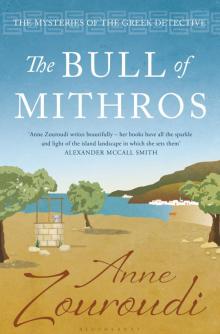 The Bull of Mithros
The Bull of Mithros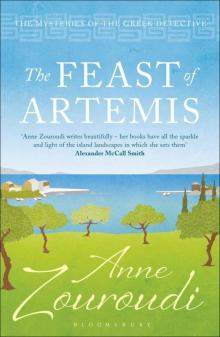 The Feast of Artemis (Mysteries of/Greek Detective 7)
The Feast of Artemis (Mysteries of/Greek Detective 7)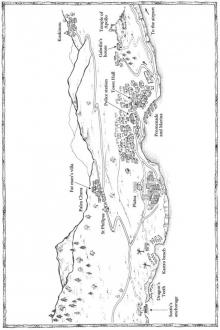 The Taint of Midas
The Taint of Midas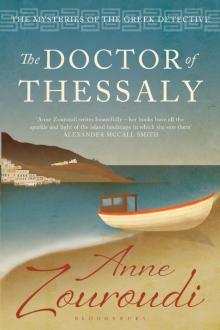 The Doctor of Thessaly
The Doctor of Thessaly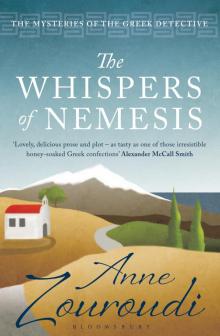 The Whispers of Nemesis
The Whispers of Nemesis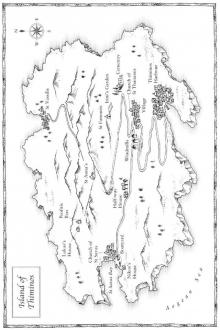 The Messenger of Athens
The Messenger of Athens